外研(新标准)版九年级下册 Module 2 Education Unit3 Language in use 课件 (共48张PPT)
文档属性
| 名称 | 外研(新标准)版九年级下册 Module 2 Education Unit3 Language in use 课件 (共48张PPT) |
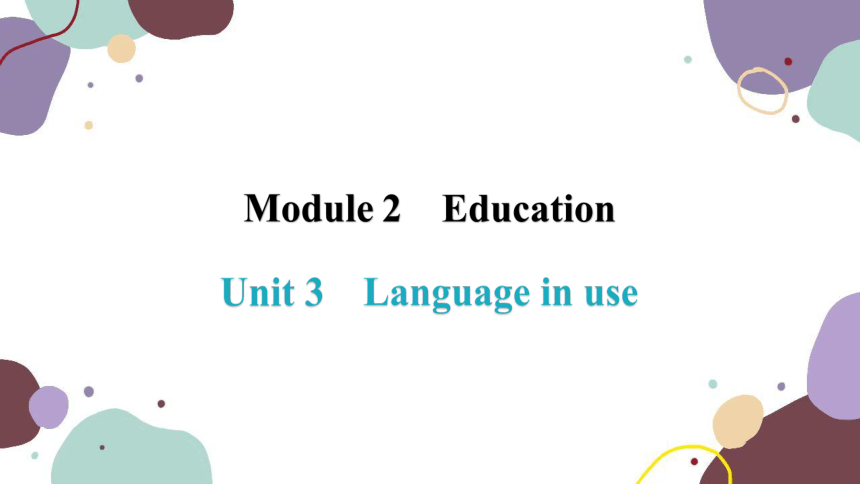
|
|
| 格式 | pptx | ||
| 文件大小 | 322.7KB | ||
| 资源类型 | 教案 | ||
| 版本资源 | 外研版 | ||
| 科目 | 英语 | ||
| 更新时间 | 2023-07-01 23:28:36 | ||
图片预览


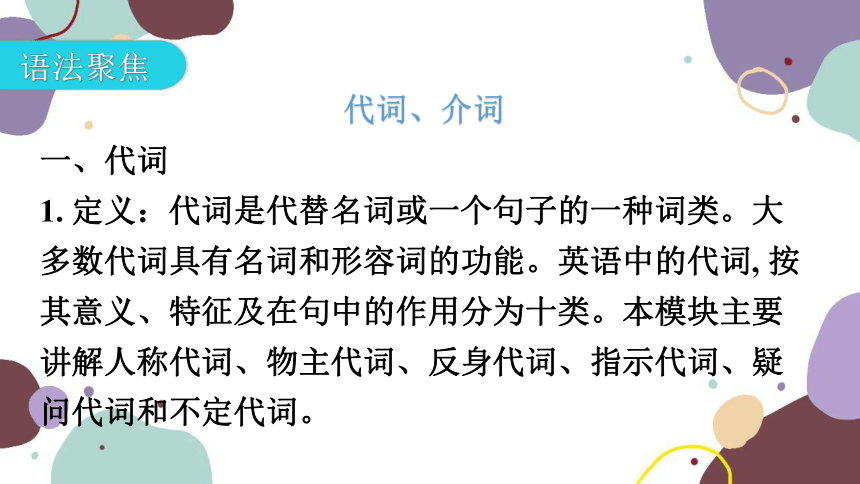
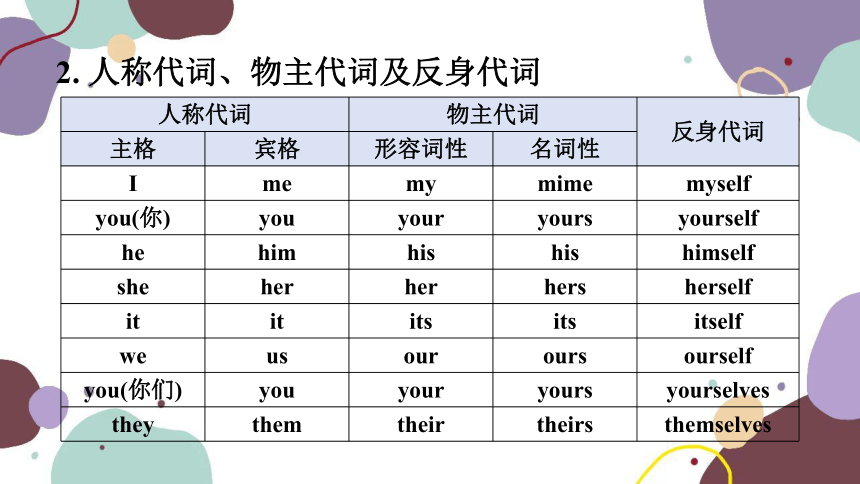
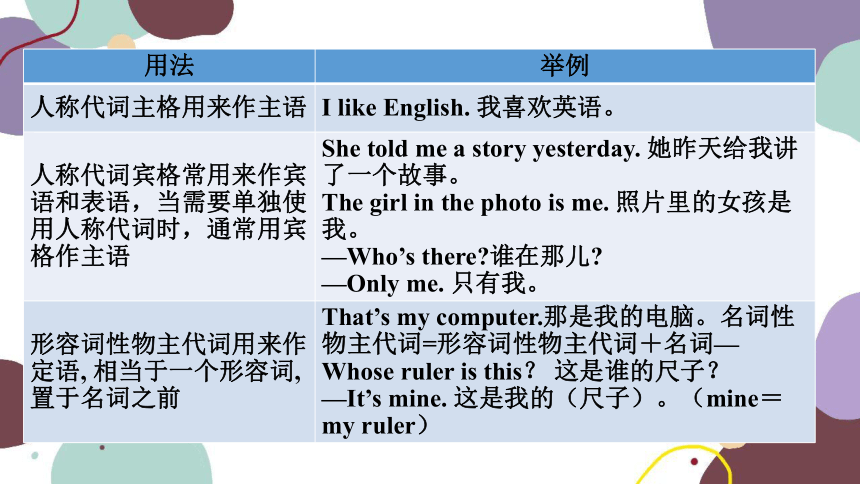
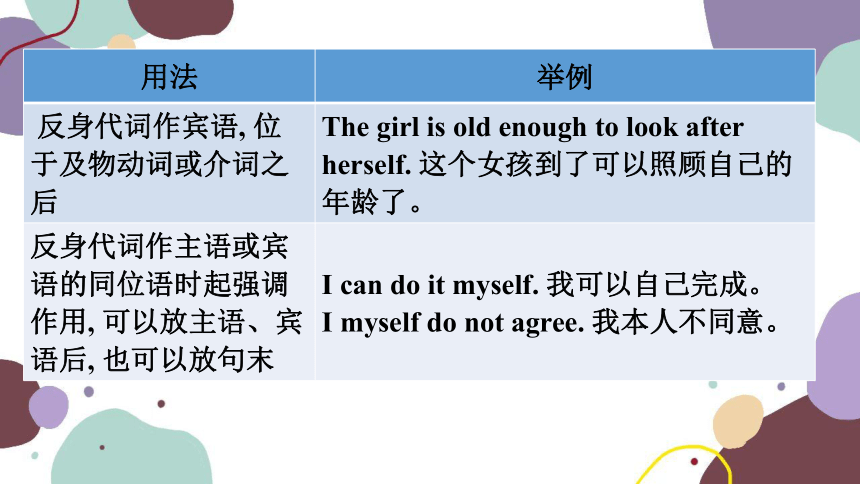
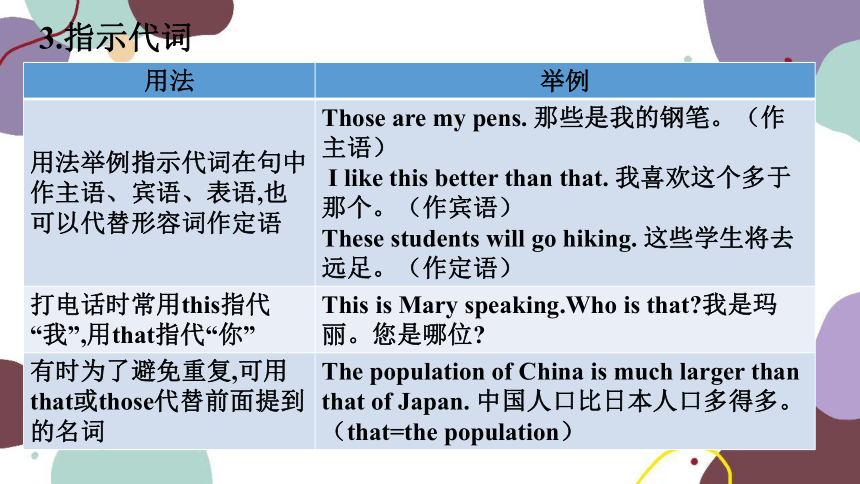

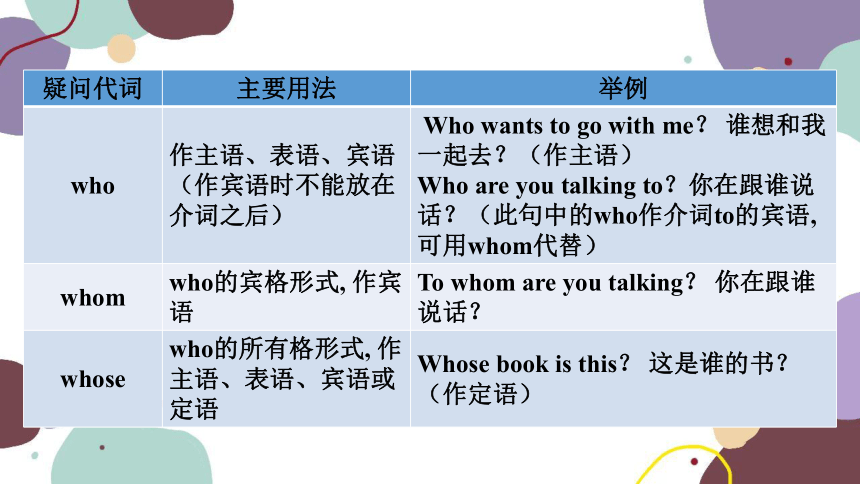
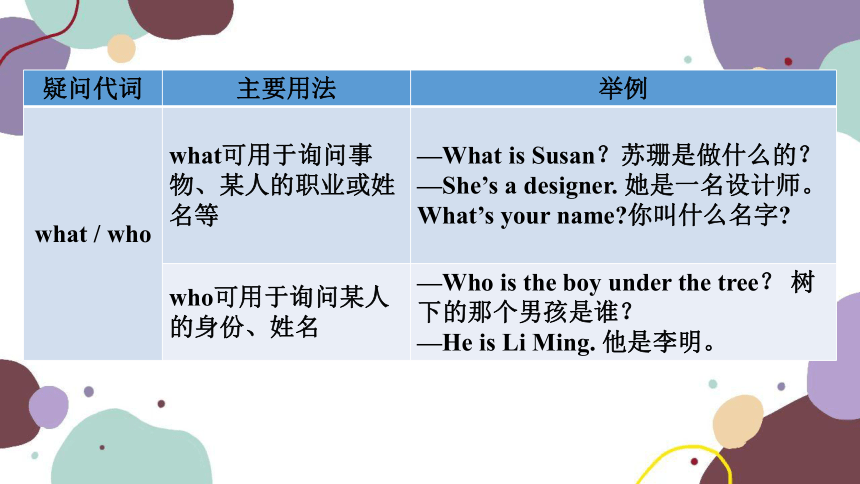
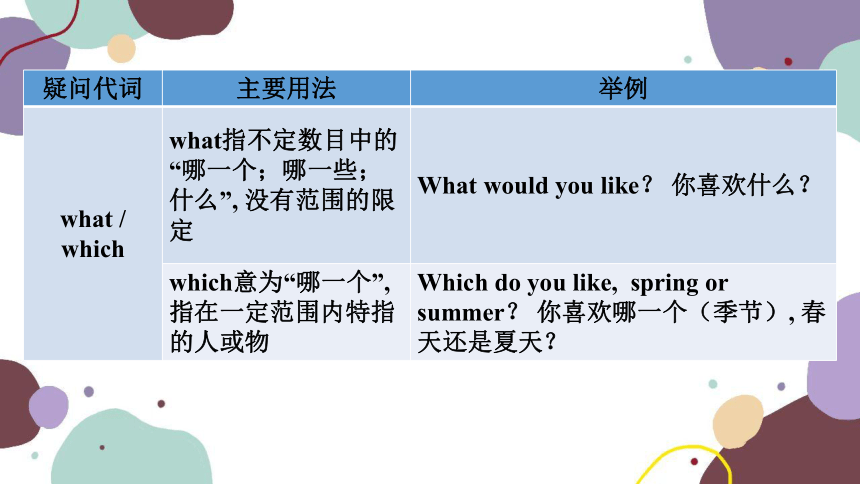
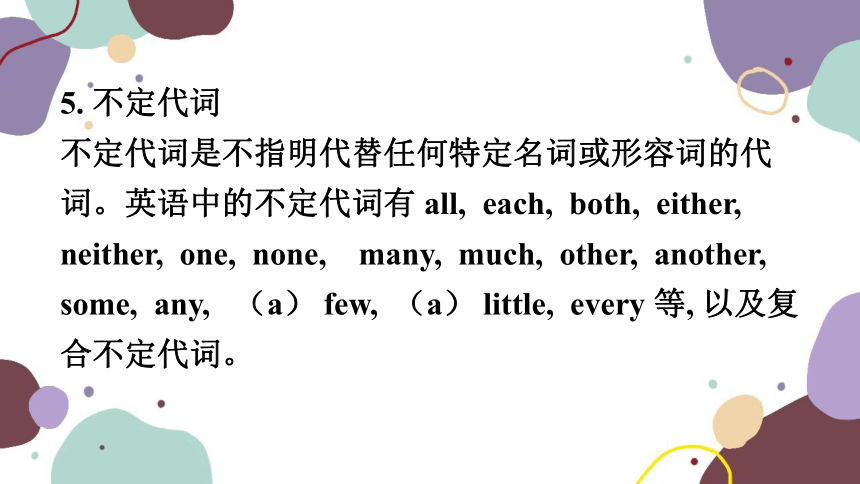
文档简介
(共48张PPT)
Module 2 Education
Unit 3 Language in use
目录
课堂小测
02
课后作业
03
01
语法聚焦
语法聚焦
代词、介词
一、代词
1. 定义:代词是代替名词或一个句子的一种词类。大多数代词具有名词和形容词的功能。英语中的代词, 按其意义、特征及在句中的作用分为十类。本模块主要讲解人称代词、物主代词、反身代词、指示代词、疑问代词和不定代词。
2. 人称代词、物主代词及反身代词
人称代词 物主代词 反身代词
主格 宾格 形容词性 名词性
I me my mime myself
you(你) you your yours yourself
he him his his himself
she her her hers herself
it it its its itself
we us our ours ourself
you(你们) you your yours yourselves
they them their theirs themselves
用法 举例
人称代词主格用来作主语 I like English. 我喜欢英语。
人称代词宾格常用来作宾语和表语,当需要单独使用人称代词时,通常用宾格作主语 She told me a story yesterday. 她昨天给我讲了一个故事。
The girl in the photo is me. 照片里的女孩是我。
—Who’s there 谁在那儿
—Only me. 只有我。
形容词性物主代词用来作定语, 相当于一个形容词, 置于名词之前 That’s my computer.那是我的电脑。名词性物主代词=形容词性物主代词+名词—Whose ruler is this? 这是谁的尺子?
—It’s mine. 这是我的(尺子)。(mine=my ruler)
用法 举例
反身代词作宾语, 位于及物动词或介词之后 The girl is old enough to look after herself. 这个女孩到了可以照顾自己的年龄了。
反身代词作主语或宾语的同位语时起强调作用, 可以放主语、宾语后, 也可以放句末 I can do it myself. 我可以自己完成。
I myself do not agree. 我本人不同意。
3.指示代词
用法 举例
用法举例指示代词在句中作主语、宾语、表语,也可以代替形容词作定语 Those are my pens. 那些是我的钢笔。(作主语)
I like this better than that. 我喜欢这个多于那个。(作宾语)
These students will go hiking. 这些学生将去远足。(作定语)
打电话时常用this指代“我”,用that指代“你” This is Mary speaking.Who is that 我是玛丽。您是哪位
有时为了避免重复,可用that或those代替前面提到的名词 The population of China is much larger than that of Japan. 中国人口比日本人口多得多。(that=the population)
4.疑问代词
疑问代词指who, which, whom, whose, what, whoever, whichever, whomever, whatever等用于引导特殊疑问句的代词。常见的疑问代词的用法如下:
疑问代词 主要用法 举例
who 作主语、表语、宾语(作宾语时不能放在介词之后) Who wants to go with me? 谁想和我一起去?(作主语)
Who are you talking to?你在跟谁说话?(此句中的who作介词to的宾语, 可用whom代替)
whom who的宾格形式, 作宾语 To whom are you talking? 你在跟谁说话?
whose who的所有格形式, 作主语、表语、宾语或定语 Whose book is this? 这是谁的书?(作定语)
疑问代词 主要用法 举例
what / who what可用于询问事物、某人的职业或姓名等 —What is Susan?苏珊是做什么的?
—She’s a designer. 她是一名设计师。
What’s your name 你叫什么名字
who可用于询问某人的身份、姓名 —Who is the boy under the tree? 树下的那个男孩是谁?
—He is Li Ming. 他是李明。
疑问代词 主要用法 举例
what / which what指不定数目中的“哪一个;哪一些;什么”, 没有范围的限定 What would you like? 你喜欢什么?
which意为“哪一个”, 指在一定范围内特指的人或物 Which do you like, spring or summer? 你喜欢哪一个(季节), 春天还是夏天?
5. 不定代词
不定代词是不指明代替任何特定名词或形容词的代词。英语中的不定代词有 all, each, both, either, neither, one, none, many, much, other, another, some, any, (a) few, (a) little, every 等, 以及复合不定代词。
(1)常见的不定代词的用法
不定代词 用法 举例
some / any some 用于肯定句中, any 多用于否定句、疑问句或条件句中。但是, 在表示请求、邀请或征求意见的疑问句中, 通常用 some 而不用any。any 有时也用于肯定句中, 此时表示“任何” I have some pens. 我有一些钢笔。
I don’t have any pens. 我没有钢笔。
Would you like some rice 你想吃点米饭吗?
Come any day you like. 随便哪天来都可以。
不定代词 用法 举例
neither / none neither指“两者中任何一个也不”;none指“三者及三者以上一个也没有” He has two sons, neither of whom is rich. 他有两个儿子, 他们都不富有。
He has three sons, none of whom is rich. 他有3个儿子, 他们都不富有。
both / all both指“两者都”;all指“三者及以上都”。both和all都可作同位语,通常位于行为动词之前,be动词、助动词或情态动词之后 My parents are both doctors. 我的父母都是医生。
All of the students are interested in it. 所有的学生对此都很感兴趣。
不定代词 用法 举例
each / either each指“两者或两者以上的每一个”;either仅指“两者中的每一个” We each get five minutes to talk about our problems. 我们每人有5分钟说自己遇到的麻烦。
There are mango trees on either side of the street. 街道两旁都有芒果树。
(2)复合不定代词
复合不定代词是由some-, any-, no-, every-加上-one, -body, -thing, -where, -time所组成的不定代词。其用法如下:
用法 举例
复合不定代词被定语(通常为形容词)修饰时, 定语应放在它们后面 There is nothing wrong with the radio. 这部收音机没有问题。
No one else loves you more than I do. 没有别的人比我更爱你。
用法 举例
指人的复合不定代词若用作主语, 其谓语动词一般用单数, 相应的人称代词和物主代词可用单数代词he, him, his (不一定指男性),或复数代词 they, them, their Everyone knows this, doesn’t he / don’t they 人人都知道这一点, 不是吗
If anybody / anyone comes, ask him to wait. 要是有人来, 让他等着。
指事物的复合不定代词若用作主语, 谓语动词只能用单数, 相应的人称代词也只能用it, 而不用they Everything is ready, isn’t it? 一切都准备好了, 是吗?
用法 举例
不定代词 anyone, everyone 等只能指人, 不能指物, 且其后一般不接of 短语;若要指物或后接 of 短语, 可用 any one, every one Everyone except me went to the concert. 除了我,其他人都去参加了音乐会。
Any one of these would be enough to change us. 这些中的任何一个都足以改变我们。
二、介词
1. 定义:介词表示名词、代词等与句中其他词的关系, 在句中不能单独作句子成分。介词后面一般有名词或名词词组、动名词、代词(如果是人称代词,则要用宾格)或从句作它的宾语。介词和它的宾语构成介词词组, 在句中作状语、表语、补语或定语。介词可以分为时间介词、方位介词和方式介词等。
2. 常见的时间介词的用法
比较项 用法 举例
at 用于具体的时刻前 at seven o’clock, at half past two
on 主要用于具体的某一天或某一天的上午、下午或晚上前, 还用于具有某种特征的一个上午、下午或晚上前 on Monday, on Teachers’ Day, on 8th August, on a winter afternoon
in 用于世纪、年份、季节、月份前或泛指一天的上午、下午或晚上 in the 21st century, in 2020, in spring, in January, in the morning / afternoon / evening
3. 常见的方位介词的用法
方位介词 用法 举例
in 指在某一立体空间范围内 Kelly is playing the violin in her room. 凯丽正在她的房间里拉小提琴。
与方位名词连用时,表示“A地在B地范围之内” Hebei Province is in the north of China. 河北省在中国的北部。
on 指某物与另一物的表面相接触 His mobile phone is on the table. 他的手机在桌子上。
与方位名词连用时,表示“两个地方接壤并且相邻” Guizhou Province is on the west of Hunan Province. 贵州省在湖南省的西面。
方位介词 用法 举例
to 与方位名词连用时,表示“A地在B地的范围之外”,且两地不接壤 Japan is to the east of China. 日本在中国的东面。
at 指在某一个点上,通常用于表示某人或某物所处的位置 Tom is waiting for his sister at the bank. 汤姆正在银行等他的妹妹。
over / above over: 在……的正上方(垂直) above:在……的上方(不一定垂直) A lamp hung over the table. 一盏灯悬挂在桌子上方。
We were flying above the clouds. 我们在云层上面飞行。
方位介词 用法 举例
under / below under:在……的正下方(垂直) below:在……的下方(不一定垂直) The ship is going under the bridge. 那艘船正从桥下驶过。
They camped a few hundred feet below the summit. 他们在山峰下面几百英尺的地方扎了营。
4. 其他常见介词的用法
介词 用法 举例
with 表示“和;同;带着;随着” with my brother 跟我哥哥一起
with best wishes致以美好的祝愿
a girl with sunglasses戴墨镜的女孩
表示“有着;具有” coffee with sugar and milk 加糖和牛奶的咖啡
a man with good manners一个很有礼貌的男士
表示“用;被;以” cut with a knife 用刀切
介词 用法 举例
in 表示“穿;戴”, 后接衣物、颜色等 He is in blue. 他穿着蓝色的衣服。
I know the man in a hat. 我认识那个戴帽子的男人。
表示“用”, 后接语言或材料, 表示手段或方法 等How do you say that in English?那个用英语怎么说?
She wrote the letter in pencil. 她用铅笔写了这封信。
介词 用法 举例
in 表示境况、情绪、状态等 in trouble陷入困境
in danger处于危险中
in surprise惊讶地
in good health身体健康
表示“关于……;在……方面” I'm weak in maths. 我的数学不好。
介词 用法 举例
against / for against表示“反对;违反”, 其反义词为for, 此时for表示“支持;赞成” Are you for or against the plan?你是支持还是反对这个计划?
except / besides except表示“除……外”, 具有排他性质 We all went to see the film except Mr Wang. 除了王先生, 我们都去看电影了。(王先生没去)
介词 用法 举例
between / among between表示“在两者之中” There is a great deal of similarity between Caroline and her mother. 卡罗琳和她的母亲之间有许多相似之处。
among表示“在三者或三者以上之中” He divided the country among his three sons. 他把王国分给了3个儿子。
一、单项填空
( )1. There’s _____ with his eyes. He feels uncomfortable.
A. anything wrong B. wrong something
C. something wrong
( )2. They are going to have their wedding _____ the morning of 1st October.
A. on B. in C. at
C
A
( )3. Humans cannot make progress _____ dreams.
A. with B. without C. through
( )4. When we succeeded in reaching the top of Mount Tai, we felt proud of_____.
A. we B. us C. ourselves
B
C
( )5. —Did you get the book from the bookstore or online
—_____. I borrowed it from the library.
A. Either B. Neither C. None
B
二、找出下列句子的错误,并在横线上进行更正
6. I have two sisters. All of them live in Wuhan.
__________________________________
7. He has never seen eyes as green as her.
__________________________________
8. Those kids are old enough to look after himself. __________________________________
9. In 14th November, my first boy was born.
__________________________________
all改为both
her改为hers
himself 改为themselves
In改为On
课堂小测
一、根据句意及首字母或中文提示填单词
1. We have parties at school, but only __________ (一次) a term.
2. He was a__________ from school yesterday, and the teacher was very angry.
once
bsent
3. I go to school on __________ (工作日)but not on Saturday and Sunday.
4. Let’s take a b__________ and have lunch.
5. We’ll soon have a p__________ meeting, and everyone’s nervous about it.
weekdays
reak
arents’
二、根据汉语意思完成句子,每空一词
6. 她将在家里做作业,而不是看电视。
She will do homework at home __________ __________ __________ __________.
7. 一群女孩子在学校旁边等着。
__________ __________ __________ __________ was waiting by the school.
instead
of
watching
TV
A
group
of
girls
8. 凯文最喜欢这个故事的哪一点?
What __________ Kevin __________ __________ about the story
9. 从去年9月起他就一直待在医院。
He __________ __________ __________ the hospital since last September.
does
like
best
has
been
in
10. 如果下个学期我通过了考试,我就可以找到工作了。
I can find a job __________ __________ __________ __________ __________ next term.
if
I
pass
the
exam
三、语法选择
Mo was waiting outside her classroom. She ___11___ sick. She always felt sick during the exam week. She had two exams that day. Physics was the first and she hated physics. It was her __12__ subject.
( )11. A. feels B. is feeling C. was feeling
( )12. A. bad B. worse C. worst
C
C
But this was the last day for the exams! Tina looked back at her from the front of the line and took a _____13_____ look. Mo thought she looked guilty. Tina was good at physics. She didn’t have a problem with _____14_____.
( )13. A. quickly B. quick C. quickness
( )14. A. something B. nothing C. anything
B
C
“Hi, Mo! It’s _____15_____ least favourite exam today,” Nina said as she arrived. Tina looked back again. “What’s wrong between you two?” said Nina. “I thought you were friends.” “Yes, so did I,”said Mo. “But she _____16_____ to me for two weeks.
( )15. A. yours B. you C. your
( )16. A. doesn’t speak B. hasn’t spoken
C. didn’t speak
C
B
She promised to help me _____17_____ for the physics exam, but she didn’t answer my calls or messages. And when I came to her house, her mum told me that she was busy. She’s forgotten who her friends are!”said Mo angrily.
( )17. A. prepare B. preparing C. prepared
A
_____18_____ that time the other students were going into the exam room. Mo gave Nina _____19_____ worried look and then followed them.
During the exam, Mo found she couldn’t answer _____20_____ question because it was too difficult. She was going to fail again!
( )18. A. In B. At C. By
( )19. A. a B. an C. the
( )20. A. a fifth B. fifth C. the fifth
B
A
C
四、短文填空
Students worked hard for the final exam. No one wanted to fail, and neither did Jane. She had worked hard all year. Before the exams she worked even _____21_____, and her sister Barbara was worried about her. She went to bed too late. The night before the first exam, Barbara insisted(坚持) that she should have _____22_____ early night and take a sleeping pill. Barbara promised to _____23_____ her up in the morning.
harder
an
wake
As she was falling asleep, Jane was afraid that she might oversleep. Her mind kept jumping _____24_____ subject to subject. At last, with the help of medicine,she _____25_____ to sleep. In no time at all, she was sitting in the examination hall, looking at the examination paper,but she couldn’t answer any of the _____26_____.Everyone around her was writing pages and pages. _____27_____ she thought hard,
from
went
questions
Although / Though
she couldn’t find anything to write about. She kept looking at her watch. Time was running out. There was only an hour to go. She started one question, wrote two sentences, gave up and tried _____28_____ one. With only half an hour left she wrote another two sentences. By this time she was so _____29_____ that she started crying. Her whole body shook. It shook _____30_____ much that she woke up. A minute later, Barbara called her name.
another
worried
so
21. __________ 22. __________
23. __________ 24. __________
25. __________ 26. __________
27. ________________ 28. __________
29. __________ 30. __________
harder
an
wake
from
went
questions
Although / Though
another
worried
so
课后作业
请同学们完成下册Module 2 Unit 3的所有练习题。
THANKS!
Module 2 Education
Unit 3 Language in use
目录
课堂小测
02
课后作业
03
01
语法聚焦
语法聚焦
代词、介词
一、代词
1. 定义:代词是代替名词或一个句子的一种词类。大多数代词具有名词和形容词的功能。英语中的代词, 按其意义、特征及在句中的作用分为十类。本模块主要讲解人称代词、物主代词、反身代词、指示代词、疑问代词和不定代词。
2. 人称代词、物主代词及反身代词
人称代词 物主代词 反身代词
主格 宾格 形容词性 名词性
I me my mime myself
you(你) you your yours yourself
he him his his himself
she her her hers herself
it it its its itself
we us our ours ourself
you(你们) you your yours yourselves
they them their theirs themselves
用法 举例
人称代词主格用来作主语 I like English. 我喜欢英语。
人称代词宾格常用来作宾语和表语,当需要单独使用人称代词时,通常用宾格作主语 She told me a story yesterday. 她昨天给我讲了一个故事。
The girl in the photo is me. 照片里的女孩是我。
—Who’s there 谁在那儿
—Only me. 只有我。
形容词性物主代词用来作定语, 相当于一个形容词, 置于名词之前 That’s my computer.那是我的电脑。名词性物主代词=形容词性物主代词+名词—Whose ruler is this? 这是谁的尺子?
—It’s mine. 这是我的(尺子)。(mine=my ruler)
用法 举例
反身代词作宾语, 位于及物动词或介词之后 The girl is old enough to look after herself. 这个女孩到了可以照顾自己的年龄了。
反身代词作主语或宾语的同位语时起强调作用, 可以放主语、宾语后, 也可以放句末 I can do it myself. 我可以自己完成。
I myself do not agree. 我本人不同意。
3.指示代词
用法 举例
用法举例指示代词在句中作主语、宾语、表语,也可以代替形容词作定语 Those are my pens. 那些是我的钢笔。(作主语)
I like this better than that. 我喜欢这个多于那个。(作宾语)
These students will go hiking. 这些学生将去远足。(作定语)
打电话时常用this指代“我”,用that指代“你” This is Mary speaking.Who is that 我是玛丽。您是哪位
有时为了避免重复,可用that或those代替前面提到的名词 The population of China is much larger than that of Japan. 中国人口比日本人口多得多。(that=the population)
4.疑问代词
疑问代词指who, which, whom, whose, what, whoever, whichever, whomever, whatever等用于引导特殊疑问句的代词。常见的疑问代词的用法如下:
疑问代词 主要用法 举例
who 作主语、表语、宾语(作宾语时不能放在介词之后) Who wants to go with me? 谁想和我一起去?(作主语)
Who are you talking to?你在跟谁说话?(此句中的who作介词to的宾语, 可用whom代替)
whom who的宾格形式, 作宾语 To whom are you talking? 你在跟谁说话?
whose who的所有格形式, 作主语、表语、宾语或定语 Whose book is this? 这是谁的书?(作定语)
疑问代词 主要用法 举例
what / who what可用于询问事物、某人的职业或姓名等 —What is Susan?苏珊是做什么的?
—She’s a designer. 她是一名设计师。
What’s your name 你叫什么名字
who可用于询问某人的身份、姓名 —Who is the boy under the tree? 树下的那个男孩是谁?
—He is Li Ming. 他是李明。
疑问代词 主要用法 举例
what / which what指不定数目中的“哪一个;哪一些;什么”, 没有范围的限定 What would you like? 你喜欢什么?
which意为“哪一个”, 指在一定范围内特指的人或物 Which do you like, spring or summer? 你喜欢哪一个(季节), 春天还是夏天?
5. 不定代词
不定代词是不指明代替任何特定名词或形容词的代词。英语中的不定代词有 all, each, both, either, neither, one, none, many, much, other, another, some, any, (a) few, (a) little, every 等, 以及复合不定代词。
(1)常见的不定代词的用法
不定代词 用法 举例
some / any some 用于肯定句中, any 多用于否定句、疑问句或条件句中。但是, 在表示请求、邀请或征求意见的疑问句中, 通常用 some 而不用any。any 有时也用于肯定句中, 此时表示“任何” I have some pens. 我有一些钢笔。
I don’t have any pens. 我没有钢笔。
Would you like some rice 你想吃点米饭吗?
Come any day you like. 随便哪天来都可以。
不定代词 用法 举例
neither / none neither指“两者中任何一个也不”;none指“三者及三者以上一个也没有” He has two sons, neither of whom is rich. 他有两个儿子, 他们都不富有。
He has three sons, none of whom is rich. 他有3个儿子, 他们都不富有。
both / all both指“两者都”;all指“三者及以上都”。both和all都可作同位语,通常位于行为动词之前,be动词、助动词或情态动词之后 My parents are both doctors. 我的父母都是医生。
All of the students are interested in it. 所有的学生对此都很感兴趣。
不定代词 用法 举例
each / either each指“两者或两者以上的每一个”;either仅指“两者中的每一个” We each get five minutes to talk about our problems. 我们每人有5分钟说自己遇到的麻烦。
There are mango trees on either side of the street. 街道两旁都有芒果树。
(2)复合不定代词
复合不定代词是由some-, any-, no-, every-加上-one, -body, -thing, -where, -time所组成的不定代词。其用法如下:
用法 举例
复合不定代词被定语(通常为形容词)修饰时, 定语应放在它们后面 There is nothing wrong with the radio. 这部收音机没有问题。
No one else loves you more than I do. 没有别的人比我更爱你。
用法 举例
指人的复合不定代词若用作主语, 其谓语动词一般用单数, 相应的人称代词和物主代词可用单数代词he, him, his (不一定指男性),或复数代词 they, them, their Everyone knows this, doesn’t he / don’t they 人人都知道这一点, 不是吗
If anybody / anyone comes, ask him to wait. 要是有人来, 让他等着。
指事物的复合不定代词若用作主语, 谓语动词只能用单数, 相应的人称代词也只能用it, 而不用they Everything is ready, isn’t it? 一切都准备好了, 是吗?
用法 举例
不定代词 anyone, everyone 等只能指人, 不能指物, 且其后一般不接of 短语;若要指物或后接 of 短语, 可用 any one, every one Everyone except me went to the concert. 除了我,其他人都去参加了音乐会。
Any one of these would be enough to change us. 这些中的任何一个都足以改变我们。
二、介词
1. 定义:介词表示名词、代词等与句中其他词的关系, 在句中不能单独作句子成分。介词后面一般有名词或名词词组、动名词、代词(如果是人称代词,则要用宾格)或从句作它的宾语。介词和它的宾语构成介词词组, 在句中作状语、表语、补语或定语。介词可以分为时间介词、方位介词和方式介词等。
2. 常见的时间介词的用法
比较项 用法 举例
at 用于具体的时刻前 at seven o’clock, at half past two
on 主要用于具体的某一天或某一天的上午、下午或晚上前, 还用于具有某种特征的一个上午、下午或晚上前 on Monday, on Teachers’ Day, on 8th August, on a winter afternoon
in 用于世纪、年份、季节、月份前或泛指一天的上午、下午或晚上 in the 21st century, in 2020, in spring, in January, in the morning / afternoon / evening
3. 常见的方位介词的用法
方位介词 用法 举例
in 指在某一立体空间范围内 Kelly is playing the violin in her room. 凯丽正在她的房间里拉小提琴。
与方位名词连用时,表示“A地在B地范围之内” Hebei Province is in the north of China. 河北省在中国的北部。
on 指某物与另一物的表面相接触 His mobile phone is on the table. 他的手机在桌子上。
与方位名词连用时,表示“两个地方接壤并且相邻” Guizhou Province is on the west of Hunan Province. 贵州省在湖南省的西面。
方位介词 用法 举例
to 与方位名词连用时,表示“A地在B地的范围之外”,且两地不接壤 Japan is to the east of China. 日本在中国的东面。
at 指在某一个点上,通常用于表示某人或某物所处的位置 Tom is waiting for his sister at the bank. 汤姆正在银行等他的妹妹。
over / above over: 在……的正上方(垂直) above:在……的上方(不一定垂直) A lamp hung over the table. 一盏灯悬挂在桌子上方。
We were flying above the clouds. 我们在云层上面飞行。
方位介词 用法 举例
under / below under:在……的正下方(垂直) below:在……的下方(不一定垂直) The ship is going under the bridge. 那艘船正从桥下驶过。
They camped a few hundred feet below the summit. 他们在山峰下面几百英尺的地方扎了营。
4. 其他常见介词的用法
介词 用法 举例
with 表示“和;同;带着;随着” with my brother 跟我哥哥一起
with best wishes致以美好的祝愿
a girl with sunglasses戴墨镜的女孩
表示“有着;具有” coffee with sugar and milk 加糖和牛奶的咖啡
a man with good manners一个很有礼貌的男士
表示“用;被;以” cut with a knife 用刀切
介词 用法 举例
in 表示“穿;戴”, 后接衣物、颜色等 He is in blue. 他穿着蓝色的衣服。
I know the man in a hat. 我认识那个戴帽子的男人。
表示“用”, 后接语言或材料, 表示手段或方法 等How do you say that in English?那个用英语怎么说?
She wrote the letter in pencil. 她用铅笔写了这封信。
介词 用法 举例
in 表示境况、情绪、状态等 in trouble陷入困境
in danger处于危险中
in surprise惊讶地
in good health身体健康
表示“关于……;在……方面” I'm weak in maths. 我的数学不好。
介词 用法 举例
against / for against表示“反对;违反”, 其反义词为for, 此时for表示“支持;赞成” Are you for or against the plan?你是支持还是反对这个计划?
except / besides except表示“除……外”, 具有排他性质 We all went to see the film except Mr Wang. 除了王先生, 我们都去看电影了。(王先生没去)
介词 用法 举例
between / among between表示“在两者之中” There is a great deal of similarity between Caroline and her mother. 卡罗琳和她的母亲之间有许多相似之处。
among表示“在三者或三者以上之中” He divided the country among his three sons. 他把王国分给了3个儿子。
一、单项填空
( )1. There’s _____ with his eyes. He feels uncomfortable.
A. anything wrong B. wrong something
C. something wrong
( )2. They are going to have their wedding _____ the morning of 1st October.
A. on B. in C. at
C
A
( )3. Humans cannot make progress _____ dreams.
A. with B. without C. through
( )4. When we succeeded in reaching the top of Mount Tai, we felt proud of_____.
A. we B. us C. ourselves
B
C
( )5. —Did you get the book from the bookstore or online
—_____. I borrowed it from the library.
A. Either B. Neither C. None
B
二、找出下列句子的错误,并在横线上进行更正
6. I have two sisters. All of them live in Wuhan.
__________________________________
7. He has never seen eyes as green as her.
__________________________________
8. Those kids are old enough to look after himself. __________________________________
9. In 14th November, my first boy was born.
__________________________________
all改为both
her改为hers
himself 改为themselves
In改为On
课堂小测
一、根据句意及首字母或中文提示填单词
1. We have parties at school, but only __________ (一次) a term.
2. He was a__________ from school yesterday, and the teacher was very angry.
once
bsent
3. I go to school on __________ (工作日)but not on Saturday and Sunday.
4. Let’s take a b__________ and have lunch.
5. We’ll soon have a p__________ meeting, and everyone’s nervous about it.
weekdays
reak
arents’
二、根据汉语意思完成句子,每空一词
6. 她将在家里做作业,而不是看电视。
She will do homework at home __________ __________ __________ __________.
7. 一群女孩子在学校旁边等着。
__________ __________ __________ __________ was waiting by the school.
instead
of
watching
TV
A
group
of
girls
8. 凯文最喜欢这个故事的哪一点?
What __________ Kevin __________ __________ about the story
9. 从去年9月起他就一直待在医院。
He __________ __________ __________ the hospital since last September.
does
like
best
has
been
in
10. 如果下个学期我通过了考试,我就可以找到工作了。
I can find a job __________ __________ __________ __________ __________ next term.
if
I
pass
the
exam
三、语法选择
Mo was waiting outside her classroom. She ___11___ sick. She always felt sick during the exam week. She had two exams that day. Physics was the first and she hated physics. It was her __12__ subject.
( )11. A. feels B. is feeling C. was feeling
( )12. A. bad B. worse C. worst
C
C
But this was the last day for the exams! Tina looked back at her from the front of the line and took a _____13_____ look. Mo thought she looked guilty. Tina was good at physics. She didn’t have a problem with _____14_____.
( )13. A. quickly B. quick C. quickness
( )14. A. something B. nothing C. anything
B
C
“Hi, Mo! It’s _____15_____ least favourite exam today,” Nina said as she arrived. Tina looked back again. “What’s wrong between you two?” said Nina. “I thought you were friends.” “Yes, so did I,”said Mo. “But she _____16_____ to me for two weeks.
( )15. A. yours B. you C. your
( )16. A. doesn’t speak B. hasn’t spoken
C. didn’t speak
C
B
She promised to help me _____17_____ for the physics exam, but she didn’t answer my calls or messages. And when I came to her house, her mum told me that she was busy. She’s forgotten who her friends are!”said Mo angrily.
( )17. A. prepare B. preparing C. prepared
A
_____18_____ that time the other students were going into the exam room. Mo gave Nina _____19_____ worried look and then followed them.
During the exam, Mo found she couldn’t answer _____20_____ question because it was too difficult. She was going to fail again!
( )18. A. In B. At C. By
( )19. A. a B. an C. the
( )20. A. a fifth B. fifth C. the fifth
B
A
C
四、短文填空
Students worked hard for the final exam. No one wanted to fail, and neither did Jane. She had worked hard all year. Before the exams she worked even _____21_____, and her sister Barbara was worried about her. She went to bed too late. The night before the first exam, Barbara insisted(坚持) that she should have _____22_____ early night and take a sleeping pill. Barbara promised to _____23_____ her up in the morning.
harder
an
wake
As she was falling asleep, Jane was afraid that she might oversleep. Her mind kept jumping _____24_____ subject to subject. At last, with the help of medicine,she _____25_____ to sleep. In no time at all, she was sitting in the examination hall, looking at the examination paper,but she couldn’t answer any of the _____26_____.Everyone around her was writing pages and pages. _____27_____ she thought hard,
from
went
questions
Although / Though
she couldn’t find anything to write about. She kept looking at her watch. Time was running out. There was only an hour to go. She started one question, wrote two sentences, gave up and tried _____28_____ one. With only half an hour left she wrote another two sentences. By this time she was so _____29_____ that she started crying. Her whole body shook. It shook _____30_____ much that she woke up. A minute later, Barbara called her name.
another
worried
so
21. __________ 22. __________
23. __________ 24. __________
25. __________ 26. __________
27. ________________ 28. __________
29. __________ 30. __________
harder
an
wake
from
went
questions
Although / Though
another
worried
so
课后作业
请同学们完成下册Module 2 Unit 3的所有练习题。
THANKS!
同课章节目录
- Module 1 Travel
- Unit 1 We toured the city by bus and by taxi
- Unit 2 It's a long story.
- Unit 3 Language in use
- Module 2 Education
- Unit 1 They don't sit in rows.
- Unit 2 What do I like best about school?
- Unit 3 Language in use
- Module 3 Life now and then
- Unit 1 They sometimes work harder.
- Unit 2 I think life is better today.
- Unit 3 Language in use.
- Module 4 Rules and suggestions
- Unit 1 You must be careful of falling stones.
- Unit 2 we must keep the camp clean.
- Unit 3 Language in use.
- Revison A
- Module 5 Look after yourself
- Unit 1 We'd better get you to hospital.
- Unit 2 Get off the sofa!
- Unit 3 Language in use.
- Module 6 Eating togethe
- Unit 1 When is the school-leavers' party?
- Unit 2 Knives and forks are used for most Western
- Unit 3 Language in use
- Module 7 English for you and me
- Unit 1 Have you ever been to an English corner?
- Unit 2 We all own English.
- Unit 3 Language in use
- Module 8 My future life
- Unit 1 Here's to our friendship and the future
- Unit 2 I know that you will be better at maths.
- Unit 3 Language in use
- Revison B
